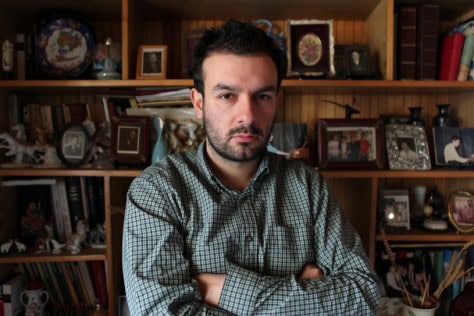It's been a long four-plus years since we've heard a new album's worth of material from our favorite Norwegian pop singer, but our allegiance hasn't wavered. Plus, during the wait between LP1 (Anniemal) and LP2 (Don't Stop―out on Smalltown Supersound), Annie sprinkled us with presents, like 2005's DJ-Kicks mix, a Teddybear's song she provided vocals for, and 2008's infectious single “I Know Ur Girlfriend Hates Me.” But when you have an enchanting pop voice like the Scandinavian chanteuse's and the recording track record to back it up with (remember 1999's
We chatted with the exceptionally fun and articulate musician from her current home in Berlin.
I listened to Don't Stop quite a few times and have been really enjoying it. I'm curious as to what your inspiration was for it―how it fits in to where you are artistically right now.
It took a while to record the album. One, because I don't really have a studio so I always have to travel to wherever I'm working or [to] whomever I'm working with. Then, also, I really wanted to do something slightly different from the previous album, [Anniemal].
I got some strings―an orchestra―to play in Norway. It was all just a very different way of making music. Of course, I also did songs like “I Don't Like Your Band,” which is completely different in another way. [The two albums] represent very different sides of myself and how I see music.
You said it took a long time to record the album and I wanted to talk a little about that. You were at one point signed to Island Records and then the album was sort of canned…
There were a couple songs I hadn't recorded when I left Island, but yeah―a lot of it was done. They had an idea of how they wanted the album to be done… and then it was leaked―I think it was the label that leaked it (as always). To be honest, I'm really happy that I had the opportunity to go back to the studio and do some more work. I feel much more pleased with it now. It's much more how I see Annie.
I heard the Island album, and of the two versions of Don't Stop, I have to say I like the Smalltown Supersound one more as well. I really love the title track. I has such a mesmerizing, spacey sort of feel to it.
It's a bit tribal almost [laughs].
Okay, so you're on Smalltown Supersound―
Yeah, it's a collaboration between my own label, [Totally], and Smalltown Supersound, but basically [Joakim Haugland] is taking care of all the business, which is good because I'm a really bad business person.
It's interesting to me how you seem to jump around so much. You're from Norway; you're labels are in Norway; you're now living in Berlin; and you do so much stuff in the U.K. How do all those places come together and make sense to you?
Well, in one way, Smalltown Supersound works outside of Norway, and Joakim is much more interested in selling records outside of Norway than in Norway. It's always been from that angle. What was really stressful about Island was that there are so many people working there and you have to talk to them every day, and they all have different ideas about the same thing. It was almost like I was working against someone rather than collaborating with someone. Working with Joakim is much easier, and he pretty much wants the same thing that I want―we see much in very similar ways when it comes to promotion and stuff.
When you think of a pop singer, especially one that's as fun and accessible as you are, you tend to conjure up images of Los Angeles or a place that sunnier, brighter than Norway, a place surrounded by coldness and fjords and snow and sea. What draws you to this style of music?
In one way, I think it's quite good. I was always thinking about moving to London or New York or something like that, and I love to go to clubs and go out and experience that feeling, but when I'm spending time in a place where that's more or less impossible, it's sort of easier for me to see things as an outsider. I think that's good… it's easier to concentrate and talk about how I see things as an outsider as opposed to just being there.
You mentioned going out, and that reminds me of how you DJ and used to have a club night, Pop Till You Drop. What does performing accomplish that DJ'ing doesn't and the other way around?
By DJ'ing, I learned a lot about sound and what works on the dance floor and what's good and what doesn't work at all. In that sense, it'd been really good for me to work as a DJ. But I've always found it harder to perform that to DJ―it's much more challenging and interesting.
You've always worked with quite a few producers, but with Don't Stop you worked with even more. Richard X and Timo Ka… Kau―
Timo Kaukolampi―it's a Finnish name. It's pretty difficult [laughs].
And Paul Epworth as well. Anyway, a lot of people tend to stick with one producer, but you seem drawn to interacting and working with numerous producers on one record. Why is that?
I was also working a lot with Brian Higgins of Xenomania as well, and what I found so cool about working with him is that he's much more of a songwriter and is very focused on the actual writing of a song. That was very interesting for me. When you work with producers, they're thinking more about the production and they leave all the lyrics and songwriting to [the artist]. Brian was working more with the songs and challenging me in many ways. I really liked that, and it was something I wanted to do more on this album; concentrate more on the actual songs and what I wanted to say and how I wanted it to represent me.
I really do love your lyrics. They're really empowering and bold―they stick with me somehow.
Oh, yeah? That's really, really good to hear! That was very important to me… to have something to say and get it out there.
Right, so Xenomania. Have you done other work with them outside of Annie?
Yeah! I have.
So you work on songwriting for other musicians?
Mm-hm. I never thought that was really possible to do, but Brian really liked my songwriting and asked if I'd be interested in writing for other artists as well since they don't work with all that many songwriters. For me, it was very inspiring to get to write other songs―it made me think differently.
I just had this song called “I Left My Heart In Tokyo” by this girl band called Mini Viva―
You wrote that song!?
I didn't write the whole song―I wrote it along with Xenomania―but it was actually supposed to be an Annie song.
Ah, that's such a fun song! I didn't realize you were a part of that! Congratulations!
On that note, I wanted to say that you're very inspiring in that you have so many layers to yourself. You're doing your own work and you're working with other people and you have all these producers. It makes me wonder what you aspire to become.
I'm very inspired by film. I watch quite a few movies when I have time. I get inspired by music that goes with visual stuff. In Berlin, there's a lot of exhibitions and all too, and that inspires me a lot. It makes me think about words and melodies… Also, I just get inspired by rhythm. Like, if I run or even just walk―I start to feel a beat and start to come up with melodies. Whatever's around.
The visuals of your music seem to be very interconnected with your music. Your album artwork, your videos, your costumes… What's the deal with the cover of Don't Stop?
That was really funny. I met this extremely great and crazy woman called Minttu Vesala and we were talking together, and she showed me these pictures of these clothes by this designer named Jean Castelbajac, and I thought the stuff was so amazing. I saw this one sort of leotard tiger dress and thought it suited the name of the record and its feeling.
Do you have any music videos coming out?
We're planning that now. It's funny because with the previous album, it was very obvious what the singles would―and would not―be. But this time around, people are enjoying so many different songs. So what [the next one should be], I'm not sure myself.
It's just too good!
It's too good to be true [laughs]! No, maybe I should have some sort of vote for the single. It's difficult…
You also have an EP, All Night, that comes along with the album somehow, right? How do those five other songs connect to the LP?
It was quite difficult for me to find out what should and shouldn't be on the album. If I could choose myself, I probably would've put them all there, but that's maybe not a very good idea. It was my suggestion from the beginning, but my manager said to definitely consider not doing that [laughs]. But, at the same time, I realized it's been so long that I've come out with something, and I just wanted to make a little surprise for people. An EP seemed good.
I'm interested in how you perceive your audiences' perceptions of you around the globe. Like, when Anniemal came to America, you were this highly lauded artist, but a little unknown, whereas in Norway I feel like it's different. What changes from country to country?
I think that in Norway, everything's much different culturally. I find that when I do interviews there it's much more personal. Like, “Do you want to have twins?” and, “Do you want to have children?” Things that I don't really think about. I feel like I'm quite far away from that world… it gets so personal… they think differently. I love to work in Norway, but it's also maybe the reason I started to release stuff outside of Norway. It's maybe not very typically Norwegian. The audience in great in Norway, but it's very exciting to play abroad. On Wednesday, I'm going to Tokyo… after that, I'm coming to the U.S.
 Q&A with Larry Gus
Q&A with Larry Gus We Own the Night: The Edison
We Own the Night: The Edison
No Comments